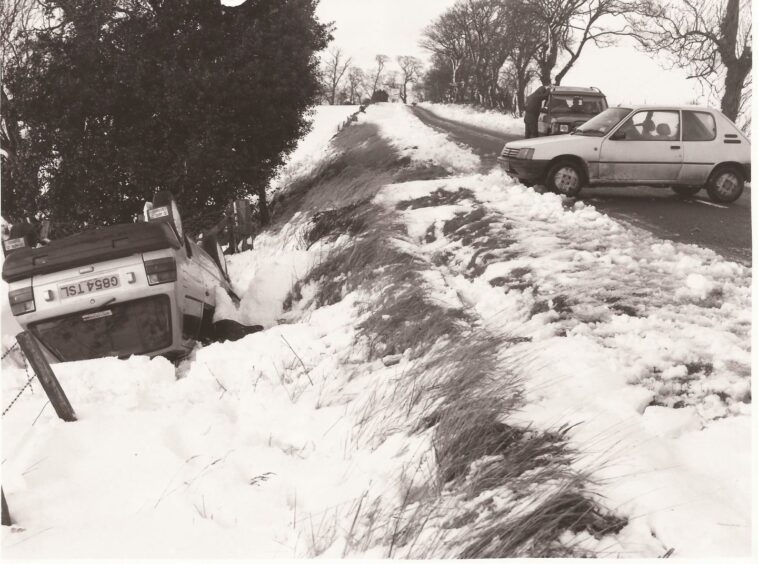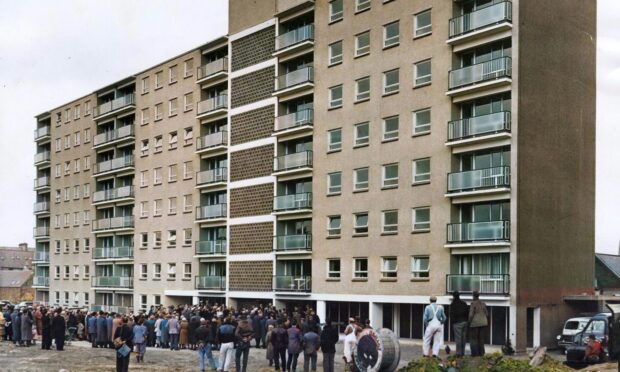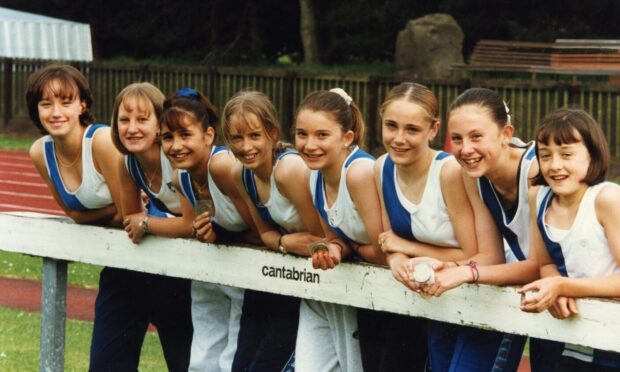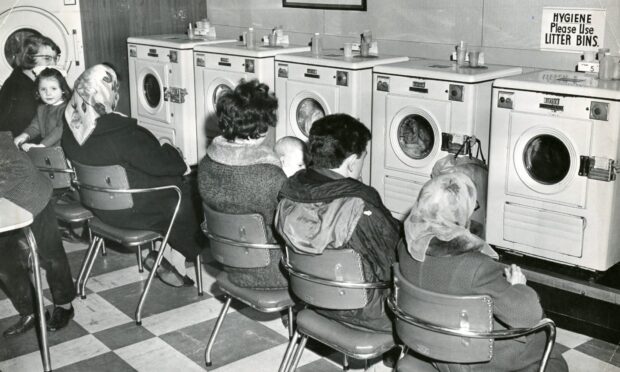
These wintry pictures will give you a chill and capture Arbroath covered in ice and snow through the decades.
The photographs of Arctic blizzards and several feet of snow in and around the town are courtesy of retired journalist Gordon Cook.
Gordon worked in newspapers and comics in a career of more than 50 years.
He said: “Thick snow can be beautiful as well as disruptive to normal life.
“The following pictures portray both sides of the coin, from the typical beauty of a sleepy Angus village, to desperate efforts to clear other roads.
“One of the most impressive shows the desperate efforts being made to make Gayfield fit for play after a heavy covering of snow, with Arbroath farmers volunteering tractors, bogies and men with shovels.
“There is even a photograph believed to have been taken in Arbroath on the morning of one of Scotland’s worst ever rail disasters, at Elliot on December 28 1906.”
Grab your gloves and scarf as we revisit some bitter winter scenes of yesteryear.
Some of these photographs have not been seen for years.
Railway bridge
A very snowy scene at the railway bridge on Dundee Road.
Gordon said: “The curious thing about this picture is that it is dated December 28 1906 which was the day of the Elliot Rail disaster which killed 22 people.
“It happened along the line to the right at 3.30pm when the light would have been failing for cameras in those days, so it might be speculated that the image was taken a few hours before the disaster.”
The long-gone Seaforth Hotel can be seen under the bridge.
Mortuary Chapel
An undated picture of the Mortuary Chapel in Arbroath’s Western Cemetery.
It was designed by Patrick Allan-Fraser as a chapel of rest for his late wife Elizabeth and her deceased parents John Fraser and Elizabeth Parrot Fraser.
Allan-Fraser passed the building over to Arbroath Town Council in 1886.
It is one of Arbroath’s most architecturally important buildings.
Railway line
“This enchanting view of the railway line in Arbroath, looking towards the High Road Bridge and then the station, is undated,” said Gordon.
“Dens Road is on the right and the massive building there still exists.
“Douglas Fraser and Sons’ factory buildings at either side of the line in the distance have both gone, replaced by Morrisons and Tesco supermarkets.
“But there are clues to the date in the fact that the engine is steam-powered, and there are more lines in use than there are nowadays.”
Arbirlot
The village of Arbirlot during the prolonged snowfall in February 1955.
Gordon said: “The bends at the bridge in the background can catch motorists unawares even in good weather.
“A Forfar farming-contractor’s lorry came to grief there 60-odd years ago.
“There is now a car park on the right where some of the cottages stood, but apart from that there is little dramatic difference.”
Keptie Pond
This is Keptie Pond in January 1963 during the Big Freeze.
Dubbed ‘the winter to end all winters’, roads and railways were put out of action and phone lines went down when people desperately needed them.
Temperatures in Scotland dipped to near -30C.
The Big Freeze lasted until March 1963.
Arbroath FC
Arbroath FC moved heaven and earth to try to make the Gayfield pitch playable for a game against Raith Rovers in January 1965.
Five tractors and 25 men were employed in clearing three inches of snow off the pitch but the Maroons might have wished they left it where it was.
Arbroath went down to a goal by Jock Richardson.
Guynd Estate
The Guynd Estate near Arbroath covered in snow in this undated picture.
Gordon said: “The Guynd is the family seat of the Ouchterlony family, and it has been said that every spelling variation of that surname – of which there are many – can be traced back through the gate that the old car is passing.
“The year is unknown but the old Austin would probably place it in the 1960s.”
The family are known to have owned the lands at The Guynd since 1612.
Sledging in the snow
What better way to while away a snowy day than going sledging?
Keptie Pond was frozen solid in January 1982 and the surrounding slopes were in use by sledgers using all manner of improvised carriages.
Did their inventions stand up to the test?
Frozen pipes in 1982
A frozen waterfall shows the consequences of plunging temperatures in January 1982 at the Caledonian building in Brothock Bridge.
“But why is that lad up the ladder?” said Gordon.
“Surely all anyone can do is wait for the thaw?”
Letham Grange
The road looking towards Colliston with Letham Grange on the left in January 1982 when the whole of the region was plunged into white-out conditions.
Transport links were severed.
The Arctic blast turned into one of Scotland’s worst winters of the 20th Century.
Cononsyth Crossroads
“This was Cononsyth Crossroads in January 1984,” said Gordon.
“The Tilcon digger was opening up the road between Arbroath and Letham.”
Snow drifts were eight feet deep in places and brought down power lines.
Legaston Brae
Arbroath and the surrounding rural area was brought to a standstill when blizzards brought chaos to Angus in January 1993.
A Nissan Micra skidded off the road and overturned at Legaston Brae.
Legaston Brae is the steep descent on the main Arbroath to Brechin road near Friockheim where a single lane was open between the piles of snow.
Stuck in the snow
Cars piled up at the side of the Friockheim to Arbroath Road in January 1993.
Arbroath gritters were unable to travel far because there were so many abandoned vehicles on the roads leading from the town.
This image was taken beside the Royal Marines base at Condor.
Meet the Snow Dog
“This picture was taken after a Carmyllie snowstorm in March 2004,” said Gordon.
“Congratulations are due to the unnamed constructors of that splendid St Bernard dog, which would have been feeling quite at home in the environment.
“The story goes that the best way to find a St Bernard in the snow is to stand quite still and listen for the snoring…”
It is the final image in our Arbroath winter gallery.
How many of these Arctic episodes of yesteryear do you remember?
























Conversation